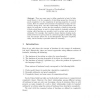Free Online Productivity Tools
i2Speak
i2Symbol
i2OCR
iTex2Img
iWeb2Print
iWeb2Shot
i2Type
iPdf2Split
iPdf2Merge
i2Bopomofo
i2Arabic
i2Style
i2Image
i2PDF
iLatex2Rtf
Sci2ools
113
click to vote
CIE
2008
Springer
2008
Springer
Many Facets of Complexity in Logic
There are many ways to define complexity in logic. In finite model theory, it is the complexity of describing properties, whereas in proof complexity it is the complexity of proving properties in a proof system. Here we consider several notions of complexity in logic, the connections among them, and their relationship with computational complexity. In particular, we show how the complexity of logics in the setting of finite model theory is used to obtain results in bounded arithmetic, stating which functions are provably total in certain weak systems of arithmetic. For example, the transitive closure function (testing reachability between two given points in a directed graph) is definable using only NL-concepts (where NL is non-deterministic log-space complexity class), and its totality is provable within NL-reasoning.
Related Content
| Added | 12 Oct 2010 |
| Updated | 12 Oct 2010 |
| Type | Conference |
| Year | 2008 |
| Where | CIE |
| Authors | Antonina Kolokolova |
Comments (0)

